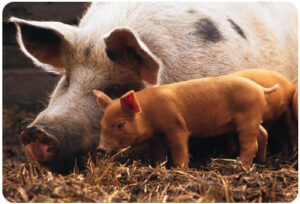Featured Topic: Climate Change Mitigation
Q&A with Wolf & Associates’ Senior Associate and Organic Industry Leader Katherine DiMatteoClimate change has been in the news a while. What brings this to the fore now?
So much has changed in the eight years between the Intergovernmental Panel on Climate Change’s (IPCC) Sixth Assessment Report, Climate Change 2022: Mitigation of Climate Change, and its Fifth Assessment Report in 2014. For example, average annual greenhouse gas emissions during 2010-2019 were higher than in any previous decade, and atmospheric CO2 levels as measured on the Mauna Loa volcano in Hawaii went from 397 to 420 parts per million. North America continues to have among the world’s highest per capita net greenhouse gas emissions. Meanwhile, near universal participation in the Paris Climate Agreement has led to policy development and target setting at national and sub-national levels, in particular in relation to mitigation, as well as enhanced transparency of climate action and support. There has been an increased interest in the climate impacts of US government policies, especially in agriculture, and since the change in Administrations. If organic agriculture is to be broadly recognized as the truly climate smart agriculture many of us know it to be, we would do well to absorb the information in this report and use it confidently to bolster our arguments, inform our opinions, and educate myriad stakeholders. A report of this magnitude must catalyze significant change, or we’ll face yet more climate impact facts trending in the wrong direction.
You’re on the board of the Climate Collaborative, which seeks to leverage the power of the natural products industry to reverse climate change. What are some actions businesses can take to help mitigate climate change?
The good news is businesses have lots of options. Encouraging organic agriculture through ingredient sourcing and procurement is just the beginning, though. Getting involved in organizations like the Climate Collaborative and the Organic Trade Association’s Sustainable Food Trade Action Council can provide inspiration, real-life examples, and access to other businesses working to cut emissions, reduce waste, reverse deforestation, and find alternatives to non-biodegradable plastic packaging. Your business influence can also be used to advocate for strong climate policies at the Federal and State level. For more detailed advice, a good consultant can offer invaluable guidance and support for your business.
The challenge feels almost overwhelming. What gives you hope and keeps you fighting for climate change mitigation?
The crisis is so acute, but the voice of climate-change deniers has been overwhelmed by the preponderance of scientific facts and direct experiences with disasters caused by fluctuating climatic patterns. Businesses and investors are calling for government to act boldly and to act now because they recognize the short and long-term costs associated with the risks caused by the changing climate. The younger generations give me hope as they recognize this is a battle for their future and are organizing, supported by Boomer organizations like The Third Act. How can one not continue to fight when there is such a diverse coalition working towards the same goal?
 Katherine DiMatteo, Senior Associate, brings breadth and depth to challenges facing businesses and not-for-profit organizations in the organic community. While she was a partner at W&A, her projects included business and strategic plans, U.S. and international regulatory analysis and advice, educational and training programs, market analysis, technical review, product development and assessment, and triple bottom line evaluations.
Katherine DiMatteo, Senior Associate, brings breadth and depth to challenges facing businesses and not-for-profit organizations in the organic community. While she was a partner at W&A, her projects included business and strategic plans, U.S. and international regulatory analysis and advice, educational and training programs, market analysis, technical review, product development and assessment, and triple bottom line evaluations.
Regulatory Updates
UNITED STATES
USDA Steps up with $300 million for Organic Transition Initiative
As part of a framework to transform the food system through increased access and better markets for small and mid-sized producers, the United States Department of Agriculture will provide $300 million to support farmers transitioning to organic production. The Organic Transition Initiative will offer technical assistance, mentoring, conservation funding, crop insurance assistance, and support for market development in targeted markets. Other new programs in the framework will target diversified poultry processing capacity, workforce development, food safety program expenses for specialty crops, food supply chain infrastructure, development of regional food business centers, increased purchases through Farm to School, and more. Read the press release here.
Organic Certification Cost Share Applications Due October 31, 2022
Certified organic farms and handling facilities, as well as those transitioning to organic production, can apply for the Organic and Transitional Education and Certification Program (OTECP) and Organic Certification Cost Share Program (OCCSP) to cover a portion of certification costs for crops, wild crops, livestock, processing/handling and State organic program fees. Producers can receive funds from both programs.
OTECP covers:
- Certification costs for organic producers and handlers (25% up to $250 per category).
- Eligible expenses for transitional producers, including fees for pre-certification inspections and development of an organic system plan (75% up to $750).
- Registration fees for educational events (75% up to $200).
- Soil testing (75% up to $100).
OCCSP covers 50% or up to $500 per category of certification costs in 2022. More.
Apply for the National Organic Standards Board
The National Organic Standards Board will have one seat open for an individual with expertise in environmental protection or resource conservation for a position starting January 2023. Nominations are due August 5.
New Learning Center Course Offers Overview of National Organic Program
NOP People, Processes and Policy, a free course on the Organic Integrity Learning Center, teaches organic stakeholders about National Organic Program structure, its functions and how the program collaborates with the National Organic Standards Board (NOSB) to protect the integrity of the organic market.
EUROPE
Germany Considers Draft Meat Labeling Bill A draft bill in Germany aimed at fostering animal welfare would require labels on fresh pork products to specify one of five conditions used to house the animals—either barn pen; barn pen and extra space; open-air barn pen; run and open land; or organic. Restaurants and wholesale dealers would not have to participate. If the bill passes, other meat products would follow. The bill would also make changes to building and licensing laws and fund renovation of stables. More.
A draft bill in Germany aimed at fostering animal welfare would require labels on fresh pork products to specify one of five conditions used to house the animals—either barn pen; barn pen and extra space; open-air barn pen; run and open land; or organic. Restaurants and wholesale dealers would not have to participate. If the bill passes, other meat products would follow. The bill would also make changes to building and licensing laws and fund renovation of stables. More.
IFOAM Organics Europe Calls for Holistic Approach to Carbon Sequestration
In a position paper on carbon farming and the revision of the Land Use, Land Use Change and Forestry Regulation, IFOAM Organic Europe advocates for considering biodiversity protection and emissions reduction along with carbon sequestration as part of a holistic approach to climate change mitigation in agriculture. They argue against selling carbon credits from agriculture to other sectors, and the focus should be on management practices that are beneficial for the climate, biodiversity and ecosystem services.
Ukraine: War Threatens Organic Sector
After nearly 20 years of increasing organic agriculture exports from Ukraine and a domestic market that is beginning to sprout, war brings the threat of destruction of the Ukrainian organic sector. Thirty percent of organic operators have had to suspend business activities, and 70% need financial assistance. Although some of Ukraine’s key products (corn, wheat, sunflower products) continue to be available, the Ukrainian ministry of agriculture has excluded many products from export, so check the ministry’s list, which is updated frequently. The biggest challenge, however, is lack of export infrastructure, including trucks and personnel. Rail alternatives have worked for some organic shipments, and the European Commission intends to assist with additional vehicles. Meanwhile, two organizations in Ukraine, Organic Initiative and Green Dossier, have set up a grant program specifically to help organic producers.

GMO News
Canada Organic Trade Association Opposes Changes to Genetic Engineering Assessments
In response to anticipated changes in the way the Canadian Food Inspection Agency (CFIA) assesses genetically engineered feed and seeds, the Canada Organic Trade Association (COTA), working with Canadian Biotechnology Action Network (CBAN), urges unity in opposing further deregulation of genetically modified organisms. CFIA’s changes follow the May 18 updates to Health Canada’s regulatory guidance which exempts genetically modified organisms (GMOs) with no foreign DNA from the Novel Food Regulations (they will be defined as “non-novel”), meaning that there will be no government oversight over these (gene-edited) GMOs. Canada’s Minister of Agriculture and Agri-Food has not yet approved similar proposals from the Canadian Food Inspection Agency (CFIA) that would let companies do their own environmental assessments for some gene-edited seeds. For more on meetings taking place this month, see www.cban.ca/NoExemptions.
England Looks to Relax GMO Oversight
A new bill designed to “remove unnecessary barriers to research into new gene editing technology” is expected to be on committee agendas this summer in England’s Parliament. England’s Genetic Technology (Precision Breeding) Bill is designed to foster development of gene-edited plants. The United Kingdom’s exit from the European Union has opened the door to relaxing oversight of genetic engineering technologies, such as gene editing. More.
Inside the Beltway
Disaster Relief Payments on The Way
Commodity and specialty crop producers impacted by natural disaster events in 2020 and 2021 will soon begin receiving emergency relief payments totaling approximately $6 billion through the Farm Service Agency’s (FSA) new Emergency Relief Program (ERP) to offset crop yield and value losses. ERP covers losses to crops, trees, bushes, and vines due to a qualifying natural disaster event in calendar years 2020 and 2021. Eligible crops include all crops for which crop insurance or Noninsured Crop Disaster Assistance Program coverage was available, except for crops intended for grazing. Qualifying natural disaster events include wildfires, hurricanes, floods, derechos, excessive heat, winter storms, freeze (including a polar vortex), smoke exposure, excessive moisture, qualifying drought, and related conditions.
More.
Supply Chain Disruptions Lead to Change in USDA Conservation Reserve Program Farmers in the last year of a Conservation Reserve Program contract can end their contracts at the end of the 2022 nesting season and will not owe repayment if approved. The change, driven by supply challenges due to the war in Ukraine, allows for a fall-seeded crop before October 1. Farmers should expect a letter from the Farm Service Agency outlining the options. In addition, the National Resource Conservation Service will allow EQIP and CSP participants to change cover crop plans without terminating existing contracts. Land coming out of the Conservation Reserve Program may be suitable for organic certification.
Farmers in the last year of a Conservation Reserve Program contract can end their contracts at the end of the 2022 nesting season and will not owe repayment if approved. The change, driven by supply challenges due to the war in Ukraine, allows for a fall-seeded crop before October 1. Farmers should expect a letter from the Farm Service Agency outlining the options. In addition, the National Resource Conservation Service will allow EQIP and CSP participants to change cover crop plans without terminating existing contracts. Land coming out of the Conservation Reserve Program may be suitable for organic certification.
Biden Administration Restores EPA’s Supplemental Environmental Projects
In a joint effort, the Justice Department and the Environmental Protection Agency will advance environmental justice using a comprehensive enforcement strategy to protect communities that have been overburdened with pollution. As part of the effort, an executive order restored Supplemental Environmental Project, which EPA used as part of enforcing environmental regulations to provide environmental or public health benefits to communities harmed by environmental violations.
Help APHIS Plan its Future
The United States Department of Agriculture’s (USDA) Animal and Plant Health Inspection Service (APHIS) is developing a new five-year strategic plan. APHIS encourages stakeholders to comment on the plan’s framework, including the mission and vision statements, core values, strategic goals and objectives, and trends or signals of change which will influence the agency’s work. Comment on Docket number APHIS-2022-0035 by July 1.
Organic Industry News & Notices
Two OFRF Reports Examine Farmers’ Needs
The Organic Farming Research Foundation’s National Organic Research Agenda and California Research Agenda reports look at the needs and challenges of organic farmers and ranchers and provide policy and research recommendations to meet those needs. In California, for example, where farmers and ranchers are responsible for 40% of all organic agricultural product sales in the country, 76% of survey respondents expressed substantial need for technical assistance with the organic management of weeds, pests, and disease. Controlling weeds was the number one production challenge nationally, with 67% of respondents citing it.
California Strives to Cut Compostable Waste in Landfills Beginning this year, all jurisdictions in California that provide solid waste collection services will be required to provide organic waste collection to residents and businesses. The move is designed to divert compostable materials from landfills to composting facilities to capture methane and to make compost more available for use as a way of fighting drought. The regulations require jurisdictions to reduce the amount of green waste sent to landfills by 75% before 2025. This may result in additional availability of compost for farming, as well as municipal use. More.
Beginning this year, all jurisdictions in California that provide solid waste collection services will be required to provide organic waste collection to residents and businesses. The move is designed to divert compostable materials from landfills to composting facilities to capture methane and to make compost more available for use as a way of fighting drought. The regulations require jurisdictions to reduce the amount of green waste sent to landfills by 75% before 2025. This may result in additional availability of compost for farming, as well as municipal use. More.
Rodale Institute to Examine Living Alternatives to Plastic Mulch
Supported by a California Department of Food and Agriculture (CDFA) grant, the Rodale Institute California Organic Center launched a new research project to examine cover crops and living mulch as a replacement for plastic mulch in strawberry and artichoke production. The three-year project will take place on the McGrath Family Farm, where the Rodale California Organic Center is located in Camarillo, CA. Researchers will evaluate the economic feasibility of artichoke and strawberry production using cover crops and no-till compared to conventional systems that rely on plastic mulch and extensive tillage, as well as the strawberry and artichoke growth, yield, and quality, and soil health, irrigation water use, and weed suppression. Results are expected to be applicable to other vegetable production that relies on plastic mulch.
OTA’s 2022 Industry Survey Reveals Growth and a Shift in Purchasing Patterns
Sales of organic products in the United States increased 2% between 2020 and 2021 to surpass $63 billion in sales, broken into $57.5 billion for food and $6 billion for non-food. Non-food sales were up 7%. With the pandemic subsiding, and buying patterns stabilizing, fruits and vegetable again led the way for organic food sales, representing 15% of the organic market and growing at 4.5% compared to 2020. Beverages showed the strongest growth overall, up 8%. After a drop in sales in 2020, snacks rebounded in 2021 with growth of 6%. Dairy and egg sales were flat in 2021, in part due to supply challenges and higher prices. More.
Younger Shoppers Buy More Organic, But Remain Skeptical of Benefits Organic items represent 29% of Millennials’ grocery share, the largest share of any age group, yet Millennial and Gen Z shoppers are more likely than other generations to believe that USDA organic certification is weaker than it used to be. Overall, 58% of shoppers hold this belief, according to research from the Hartman Group in their Organic 2022 report. Shoppers wish that USDA certification standards were stronger around animal welfare, worker protections, and soil restoration and increased biodiversity. Meanwhile, the number of consumers who cite cost as the biggest impediment to purchasing organic products—still the top objection—has fallen ten points since 2020.
Organic items represent 29% of Millennials’ grocery share, the largest share of any age group, yet Millennial and Gen Z shoppers are more likely than other generations to believe that USDA organic certification is weaker than it used to be. Overall, 58% of shoppers hold this belief, according to research from the Hartman Group in their Organic 2022 report. Shoppers wish that USDA certification standards were stronger around animal welfare, worker protections, and soil restoration and increased biodiversity. Meanwhile, the number of consumers who cite cost as the biggest impediment to purchasing organic products—still the top objection—has fallen ten points since 2020.
Shoppers Continue to Favor Sustainable Products
Despite a jump in food prices, surveys in the United States and Europe indicated that shoppers will continue to prioritize sustainable products. Specifically, the market research group Euromonitor International reported that about half of consumers across dozens of countries were willing to pay more for packaged products with claims related to sustainability, including organic, all natural, non-GMO and more.
Sustainability is Important to Younger Shoppers, Reveals Survey
The International Food Information Council’s 2022 Food & Health Survey revealed that 52% of consumers believe their food purchases have an impact on the environment, with Millennials, parents of young children, the college-educated and people with higher incomes more likely to say so. In addition 57% are concerned about food waste with Gen Z, Millennials and Gen X more likely to agree than Boomers. Within Gen Z, 73% agree that they have a greater concern about the environmental consequence of their food choices than other generations. Compared to Boomers, they are more likely to purchase products labeled as carbon neutral or plant based.
Organic Community
Share Your Expertise at EcoFarm
The 2023 EcoFarm Conference seeks workshop proposals by June 17 for its event January 18-21, 2023. Sign up online.
IFOAM Celebrates 50 years Even as a Search for
New Director Begins
IFOAM—Organics International will hire an interim executive director to step in when the current director, Louise Luttikholt, leaves the organization at the end of July to take on other work challenges. In addition, the organization is celebrating 50 years, and offers a toolkit to help spread the word about the benefits of organic agriculture during its Year of Organics campaign.
Congratulations Organic Trade Association Board Members!
The Organic Trade Association seated new board members at its annual meeting. Board officers and committee members include:
- President–Paul Schiefer, Amy’s Kitchen
- Vice President–Tracey Favre, Fig Hill Farm Consulting
- Treasurer–Domenic Borrelli, Danone North America
- Secretary–Britt Lundgren, Stonyfield Farm
- Community Relations Committee: Chair–Adam Warthesen, Organic Valley; Vice-Chair–David Lively, Organically Grown Company
- Governance Committee: Chair–Bob Kaake, Slice of Kaake Consulting; Vice-Chair–Ann Marie Hourigan, Whole Foods
Re-elected and re-appointed board members are:
- Mike Menes, True Organic Products
- Ann Marie Hourigan, Whole Foods Market
- Doug Crabtree, Vilicus Farms
- Domenic Borrelli, Danone North America
New board members are;
- Johanna Phillips, Ecocert
- Daniella Velazquez de Leon, Organics Unlimited
OMRI Keeps Growing—and Hiring
Job openings at the Organic Materials Review Institute include software developers, program specialists, and Executive Director.
We Joined BPIA
Wolf & Associates recently joined the Biological Products Industry Alliance, which promotes the responsible development of safe and effective biological products including biopesticides, biostimulants, and biofertilizers as beneficial tools for commercial agriculture, forestry, golf courses, home gardens, horticulture, ornamentals, public health, and more through education, outreach, and advocacy activities at the state, federal, and international levels.
Congratulations to Wolf & Associates’ Client Blue Ocean Barns
Blue Ocean Barns’ natural digestive aid for cattle that reduces enteric methane emissions is now authorized for commercial use in California. Made from a red seaweed, the supplement promotes higher energy yield from the digestion of hay and grasses and can reduce cows’ methane emissions by 80% or more without changing the taste of milk or meat from the cattle.

